Contest conducted by Marc Smith
We are now two-thirds of the way through the annual competition, and it will not be long before regular competition entrants start to discard their poorest scores. Now is the time to cement your place in the Top 20 as we head for the pointy end of the competition.

I am pleased to report on the successes of panel members at the U.S. Summer Nationals in Toronto. The first major event to be decided was the Grand National Teams, with Bobby Levin a member of the Las Vegas team that came from behind to eke out a 5-IMP victory in the final.
In the Spingold, Bobby Levin, Sjoert Brink and Michal Klukowski were all on teams eliminated at the quarter-final stage. That left just one panel member standing, Giorgio Duboin (left), playing on a truly international team, with players from Greece, France, Poland and Italy. Giorgio’s team made it to the final before losing a close-fought match by just 12 IMPs.
We are delighted to welcome to our panel a member of the winning Norwegian women’s team from the recent European Championships in Denmark, Gunn Tove Vist. Gunn Tove first became a European champion with victory in the Mixed Teams at the 2009 European Transnational Championships. More recently, she won a silver medal in the Mixed Pairs at that same event in 2023. She made her debut in the Norwegian Women’s team in 2008, winning a European bronze medal in 2018 before capturing gold this year.
We have a record number of guest panelists, following a multi-way tie for the win in the June competition. Chris Depasquale from Australia, transitioned from chess to bridge when he moved to Darwin in 2011. He says, “Playing with the redoubtable Michael Courtney, I won the Butler Pairs at the Australian National Championship in July 2023.” He is one of less than a handful of people in the world with national championship victories in both chess and bridge. Nao Tabata was a member of the French teams that won silver medals at the 2019 Under-21 European Teams and gold at the 2022 Under-26 European Teams. He will be in the French team at the European Youth Championships in Poland this month and at the World Championships later this year. Stephen Kornegay is a regular player at the F2F club in Arlington, Texas, where he also directs three games a week. He typically plays with his partner of 40 years, his wife Nancy Kornegay. Both of them have over 10k MPs. Wubbo de Boer from Netherlands says, “In the 1980s I played for the Dutch Juniors (against you Marc!) (Yes, I remember. MS). Then I played for the Dutch Open team with Bauke Muller until I stopped playing international bridge in 2001 and went for a social career. From 2009 on, my wife Agnes Snellers and I, have been captain and coach of the Dutch Under-26 team with some ups and downs.” What Wubbo modestly does not mention is that he was a member of the Dutch team that became the youngest-ever winners of the Bermuda Bowl in Santiago in 1993.
A couple of this month’s hands have been submitted by regular competition entrants. Hand 3 was sent to me by Brian Ransley from England, a one-time partner and cricket captain, and Hand 4 is a contribution from Michael Moss from California, USA. Thanks to both of them. If you have a hand that you think would produce an interesting panel discussion, please send me details. Remember that the best problems offer three or more sensible actions rather than being a straight choice between two.
Panelists vote for at least four different options on all eight hands in this set. However, one action attracts at least 10 panelists on every deal and they produce a clear majority vote on four of the hands.
This is looking like another tough set, with a couple of the deals causing major problems for large numbers of competitors. The most popular action chosen by the competition entrants scores ‘10’ on four of the eight hands, and voting with the largest group of competitors this month scores 61/80 (down from 65/80 in July). The average score this month is 48.67 (down from 53.14 on Set 24-07). Enough from me, let’s get on with the show…
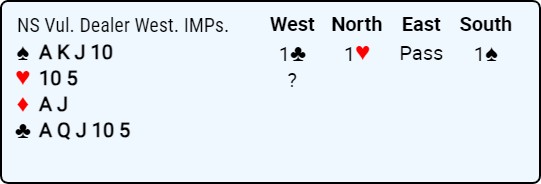
|
ACTION |
MARKS |
PANEL |
Competitors' |
|
Pass |
10 |
14 |
14 |
|
1NT |
8 |
6 |
10 |
|
2♥ |
6 |
1 |
9 |
|
2♠ |
6 |
1 |
5 |
|
2♣ |
5 |
1 |
20 |
|
2NT |
5 |
2 |
4 |
|
Dbl |
5 |
3 |
18 |
|
3♣ |
2 |
0 |
12 |
|
4♠ |
0 |
0 |
2 |
|
3NT |
0 |
0 |
1 |
|
4NT |
0 |
0 |
1 |
Competition Entrant Average Score: 5.28
We begin with a hand on which the panel vote for seven different options, although there is a clear favorite. However, the two most popular choices amongst competitors attracted only minority votes from the panel. Let’s hear what the experts have to say…
DUBOIN: Pass. I do not see a better option.
LARSSON: Pass. Hopefully, they will bid too much and I can start to double.
MOULD: Pass. At this vulnerability, this looks an easy decision for this round.
VILLAS-BOAS: Pass. They are vulnerable.
ROBSON: Pass. At these colours, I’m more than happy to defend 1♠ if they play there.
DE BOER: Pass. Let's see where they go. There is no need to take action with so much defense and partner passing.
COHEN: Pass. At these colours, let's see where this is going. If I double, they are off the hook (as partner will take it out).
MEYERS: Pass. The opponents are vulnerable, we are not. If it goes Pass-Pass, partner will strain to back in if he has anything worthwhile.
SHENKIN: Pass. 1♠ is usually forcing, so let’s wait and see what is going to happen.
McGOWAN: Pass. It pains me, but I cannot think of a sensible alternative. Defending 1♠ looks like my best route to a plus score! It seems unlikely that my vulnerable opponent is psyching, but if it comes back to me at 2♥, I shall venture a double.
(At the table, it would have gone 2♦-Pass-2♠ back to you… double here too, presumably?)
SCHMIDT-ZOCHOWSKA: Pass. Assuming 1♠ is forcing, our intention is, when it comes back to us after a likely 2♦/2♥, to balance with 2♠. We believe 2♠ right now would rather show a strong club suit, a spade stopper, and would ask for a heart stopper.
(Isn’t that fairly close to what you have? Perhaps you need a sixth club…)
BIRD: Pass. I expect partner to hold something like 0-2 HCP. I could bid 1NT (certainly not 2NT) to pick up the game when partner has a surprising 5-6 HCP. However, passing is better, particularly as many pairs treat South’s 1♠ as forcing, so there is likely to be more bidding. Anyway, defending 1♠ for +200 would be OK, with nothing good available our way.
HUNG: Pass. I plan to double on the next round (likely implying a good hand with spades). If there is no next round, well, at least the opponents are vulnerable.
Chris perfectly summarizes the case for the majority.
DEPASQUALE: Pass. It appears that partner has a blizzard, making game our way unlikely, whereas I expect to show a profit against any contract N/S land in. If North bids 1NT and that comes around to me, I shall double, which must be for penalties as I didn’t act this time around. I won’t double now as partner will likely bid 2♦.
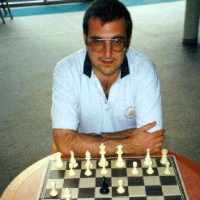
The rest all took action. This attracted the largest number…
WANG: 1NT. I show a good balanced hand.
S BALDYSZ: 1NT. Hoping to make it. This should show something along the lines of 18-20 balanced (at least, it would in Polish Club).
C BALDYSZ: 1NT.
KORNEGAY: 1NT. It looks like you have three possible bids, 1NT, Pass or 2♣. I chose 1NT, which might put me in the money if the other table opened 2NT.
VIST: 1NT. No bid really describes this collection, but I need to tell partner I have a strong hand. Even though I don't have a heart stopper, my choice of bid is 1NT.
Simon summarizes the case for 1NT.
DE WIJS: 1NT. I might have opened 2NT here. Now I am a bit strong for this 1NT rebid, but I have no obvious way to catch up. In this kind of auction (LHO bids a suit and RHO doesn't support) I am not too worried about a heart stop. The alternative is to just stay quiet and hopefully collect a couple of 100's from their partscore but, should LHO retreat to 2♥/2♦, a plus score is far from sure.
A couple thought 1NT not quite enough.
ZIA: 2NT. The most likely game. Partner needs very little to raise, and to make.
BROCK: 2NT. Maybe I should just bash 3NT but there really is no reason partner should have anything at all.
A couple tried to show a 2NT bid whilst also sorting out stoppers…
RONDON: 2♥. You can either show or ask for a stopper in this situation. I'll choose asking, as I believe that is a more popular approach.
TABATA: 2♠. This should be natural and strong.
Strong, for sure, but I’m less convinced about natural.
Marty was the lone supporter of the competitors’ most popular choice.
BERGEN: 2♣. In case N/S get to 2♦ or 2♥ and partner needs to compete to 3♣.
There is rarely a competitive auction in which double does not attract some support…
SILVER: Dbl. Everything these days starts with a double, so I will double now, and think later.
HULT: Dbl.
MARSTON: Dbl. Takeout. Next, I will bid spades to show spade strength, not hearts.
This hand comes from the final of the Brazilian Open Trials. At one table, West doubled and the auction continued 2♦-P-2♠-All Pass. 2♠ went three down for +300 undoubled. If you pass, it is likely to go the same way, and a double now would surely collect +800. At the other table, West bid 2♥ but then passed when his partner erroneously bid 3♦. With trumps 4-1, 3♦ was not a success (two down for -100) but, opposite x/QJxx/9xxxxx/Kx, 3NT had nine easy tricks. Those bidding 2♥, 2♠ or 2NT should surely get to 3NT. With a 6-count facing 18-19, partner should also raise 1NT, but will he?
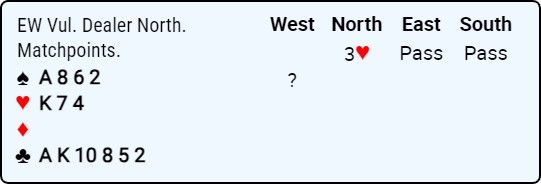
|
ACTION |
MARKS |
PANEL |
Competitors' |
|
3NT |
10 |
20 |
10 |
|
4♣ |
7 |
6 |
46 |
|
Pass |
5 |
1 |
15 |
|
Dbl |
4 |
1 |
25 |
|
5♣ |
2 |
0 |
1 |
|
4♥ |
0 |
0 |
2 |
|
3♠ |
0 |
0 |
1 |
Competition Entrant Average Score: 5.99
This deal produced the panel’s biggest majority this month, although only 1-in-10 competitors agreed with them. Almost half of competition entrants preferred the choice of the minority faction on the panel, so let’s start with that group…
MEYERS: 4♣. What are my other choices?
KORNEGAY: 4♣. For me this is a natural bid, not non-leaping Michaels.
C BALDYSZ: 4♣.
A few mention the obvious alternative…
ZIA: 4♣. Hopefully, this isn’t non-leaping Michaels, which I think is an overrated method. If it was, I guess I would have to bid 3NT.
DUBOIN: 4♣. 3NT is possible, but it is not my style, so 4♣ is my choice.
VILLAS-BOAS: 4♣. 3NT is a dangerous option, but I prefer 4♣.
A huge majority opt for that ‘dangerous option’…
MARSTON: 3NT. This is my guess as to the best contract.
HUNG: 3NT. Nothing's perfect, and every action (including pass) is dangerous.
WANG: 3NT. I think it’s easy to make.
SHENKIN: 3NT. Well, my hearts are in right place.
We all know you’re a sweetheart, Barnet 😊
ROBSON: 3NT. With this heart holding, it’s hard to look past 3NT. I am buying the number of times Hamman’s Rule is mentioned.
Sorry, Andrew…. Surprisingly, only one succumbed to the temptation…
MOULD: 3NT. Maybe this is stretching Hamman's First Law past its breaking point, but it is this or 4♣ (and, of course, if you are playing non-Leaping Michaels then it is 3NT or errrr.....)
Many recognized that their selection came with no guarantees…
BERGEN: 3NT. I'm not proud of this, but striving to overcall 3NT against a three-level pre-empt is one of my "principles of a lifetime."
COHEN: 3NT. With my eyes closed. Picture something like xxx/xx/AKxxx/Qxx opposite. If I don't bid 3NT, it's not getting bid.
LARSSON: 3NT. I hate this bid. An alternative for sure is 4♣, even if it does/does not show 5-5 in the black suits. But I will take my chances on 3NT.
McGOWAN: 3NT. Anything else risks partner insisting on playing in diamonds.
HULT: 3NT.
RONDON: 3NT. Tough hand. Here I can bid 3NT in comfort as I have no one across the table who will complain about bidding it with a void if it goes wrong.
DEPASQUALE: 3NT. If 4♠ was feasible, I may have heard from partner already. There are plenty of 6 HCP hands partner can have where I will make nine tricks on a heart lead, something like Kxx/xx/J10xxx/Qxx, for example. Even with a longer string of diamonds, partner will stick 3NT at matchpoints to protect my heart stopper on the opening lead.
Some do not have a natural 4♣ available to them…
DE WIJS: 3NT. I have too much potential for nine tricks to go silent here. 4♣ would show spades and clubs for me. That still is an alternative, but I like the prospects of making nine tricks better.
VIST: 3NT. Ahhhh... Another hand where I don't really have a bid that fits my hand. If I double, my partner will most probably bid diamonds. If I'm lucky she bids spades or clubs, but I'm not that lucky. For me, 4♣ would show 5+♣/5+♠, so that is an option, but not only am I spade short but it is also not the best of suits. Therefore, I’ll take my shot at 3NT.
Sally echoes my feelings about natural 4m overcalls.
BROCK: 3NT. For me, 4♣ is not an option as it would be non-leaping Michaels. I find I often wish I could bid a natural 4m in these auctions, but things usually turn out that I am glad I couldn’t. 3NT seems our most likely game.
S BALDYSZ: 3NT. I play 4m here as two-suited, so a natural 4♣ is not an option. Opposite partner’s average 10-count, I’ll have a shot at making 3NT. The danger of doubling is that you’ll hear some number of diamonds from partner.
Others also mention double as the alternative…
SCHMIDT-ZOCHOWSKA: 3NT. We all know the risks and the benefits of such a bid. Double would force us to bid 5♣ if partner bids diamonds, and that would be too much.
BIRD: 3NT. If 5♣ is a make, I should have a good chance of making 3NT. If you double and hear 5♦ from partner, justice will have been done.
Our former Bermuda-Bowl winning guest, sums up the case for the majority.
DE BOER: 3NT. This is both the practical bid and the most likely game to make. Pass is possible but bidding 4♣ and by-passing 3NT is not an option for me (and many partnerships play 4♣ as Michaels anyway). I also don't want to double and wait for a diamond bid by partner. Double will only be good when partner has four or more spades.

Nao, our French junior international, approaches the problem with the optimism of youth tinged with a hint of realism. For this, he earns “Comment of the Month” honours.
TABATA: Dbl. At matchpoints, finding the spade fit seems crucial. Occasionally, partner bids 3NT or Pass, which should work out fine. If partner bids 4♦, I bid 5♣. And if partner bids 5♦, I guess we score 0% and go to the next board.
At matchpoints scoring, I expected more support for what turned out to be a solo choice from Joey.
SILVER: Pass. Since we are playing pairs, all I am looking for on this hand is to score plus, and I think we have more of a chance of achieving that goal on defense than on offense! Colour me yellow, very very old, and afraid.
And Joey wins a moral victory. At the table I was watching, West took a shot at 3NT, which was not a success opposite Kxx/xx/Qxxxxx/xx. Going fewer down in 4♣ scores slightly better, but only defending produces a plus score.
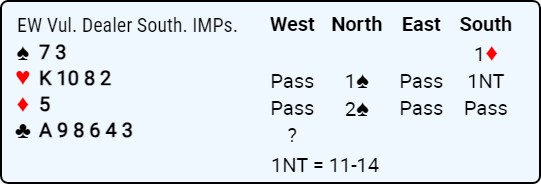
|
ACTION |
MARKS |
PANEL |
Competitors' |
|
Pass |
10 |
15 |
57 |
|
Dbl |
8 |
9 |
22 |
|
3♣ |
6 |
3 |
19 |
|
2NT |
5 |
1 |
2 |
Competition Entrant Average Score: 8.70
The question is, “Are you prepared to allow the opponents to play peacefully at the two-level?” More than half of both panelists and competition entrants were willing to do so, making this one of the highest-scoring hands of the year so far.
WANG: Pass. There’s nothing I can bid.
VILLAS-BOAS: Pass. I need a little more to double, so I pass.
VIST: Pass. Even though my partner probably has something, I think I land on a pass at IMPs. You can't win ‘em all.
McGOWAN: Pass. I might have bid something last time but, at this vulnerability, it seems far too dangerous now.
DUBOIN/HUNG/C BALDYSZ: Pass.
DE BOER: Pass. I am getting to be an old man. The vulnerability is not attractive and partner, who probably has an opening bid with diamonds, didn't take any action. (I call it wise, rather than old, Wubbo)

BIRD: Pass. To risk -500 (or more) competing for a part-score is not a sound gamble, even when sitting on a panel keen to display their fearlessness.
LARSSON: Pass. I would have bid 2♣ on the previous round, but I am assuming I fell asleep. Now I struggle between Pass/Double/3♣. I give up, I pass. I’m actually pretty sure this is the wrong bid, but since I was tired, maybe it was for the best.
As some point out, the opponents have not found a fit…
COHEN: Pass. There is no safety at all and no assurance of a fit. Partner could easily be something like 4-3-5-1. I'll try to win it on some other board.
S BALDYSZ: Pass. It doesn’t look too optimistic. Depending on the opponent’s style, 2♠ could be anything from a 4-count and a 10-count. They have not found a fit so my partner could still have a 4-3-5-1 shape. At matchpoints, I might do something, but it seems too risky vulnerable at IMPS.
KORNEGAY: Pass. If non-vulnerable, I would double, but vulnerable at IMPs this could be disastrous. The opponents have not found a fit so there is no guarantee that we have one. Aggressive players will either bid 3♣ or Double.
TABATA: Pass. This seems like a misfit hand. Partner appears to have points but couldn't bid, so he likely has some spades and diamonds.
DEPASQUALE: Pass. Discretion being the better part of valour. Yes, we might pick up a nice penalty if we double and partner has the right hand to pass (three aces and a singleton club would be nice). But what will partner do with Axx/Axx/KJxxx/Jx? When North has KQJTxx/xxx/xx/xx, 2♠-Doubled will be cold and we can’t make anything.
However, almost half the panel were willing to put their head above the parapet…
MARSTON: Dbl. I am not yet willing to say goodbye.
RONDON: Dbl. I have the unbid suits and the desire not to let them play at the two-level.
ROBSON: Dbl. I’m not selling out, and double caters to the penalty pass (admittedly unlikely), and loses nothing.
MEYERS: Dbl. I am not bidding 3♣ and I don't like Pass.
BERGEN: Dbl. I LOVE 6-4 hands, as well as hands with all their strength in their two longest suits, so I'm not passing here (and I wouldn't have passed 1NT either). I believe that being vulnerable does NOT mean you must play scared bridge.
“Colours are for children,” as Marty has previously observed.
HULT: Dbl.
SHENKIN: Dbl.
BROCK: Dbl. OK. I dare! Partner will know that I don’t have five hearts as I didn’t overcall 1♥, and so he should let me play clubs if he doesn’t have four hearts.
MOULD: Dbl. I've conceded 570 before, and gone for 800 before.
Zia makes a very valid point in favour of a third alternative.
ZIA: 3♣. Double puts too much pressure on partner, who may be 3-3-5-2. Would he bid 2NT over the double with that shape? He probably should, but...
Some would have bid on the previous round…
SILVER: 3♣. I should have acted one round earlier, and one level lower. The question to be answered is, will the Great Shuffler punish me for my tardiness.
SCHMIDT-ZOCHOWSKA: 3♣. We would have bid 2♣ over 1NT. The situation is now at risk but we refuse to Pass. We have a choice between 3♣ and double. Double would show a more balanced hand, in theory.
DE WIJS: 2NT. Showing two places to play, rather than three with a double. Partner will not know whether I have 4♥ or 4♦, but at least he knows there is an alternative to playing 3♣.
Brian Ransley, who was sitting East, sent me this hand grumbling about his partner’s pass. East held Q/AQ9x/A10xxx/J10x, so both 4♥ and 5♣ were decent and making contracts (even with hearts breaking 4-1). Your partner has a lot of high-class company agreeing with him this time, Brian.
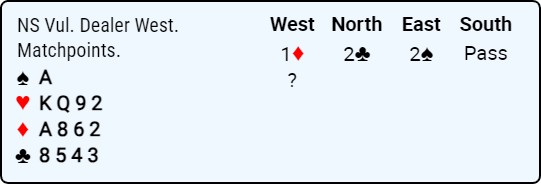
|
ACTION |
MARKS |
PANEL |
Competitors' |
|
2NT |
10 |
15 |
31 |
|
3♣ |
8 |
7 |
15 |
|
3♥ |
7 |
5 |
23 |
|
Pass |
5 |
1 |
25 |
|
3♦ |
5 |
0 |
3 |
|
3♠ |
0 |
0 |
2 |
|
3NT |
0 |
0 |
1 |
Competition Entrant Average Score: 7.31
This is a really nasty problem, but a third of competition entrants agree with the majority vote from the panel. However, a quarter of competitors opted to pass a forcing bid, and they score a rather fortunate 5/10 for that as there was some acknowledgement on the panel that such an unusual action might a winning choice.
BROCK: 2NT. What a horrible problem.
VILLAS-BOAS: 2NT. I don’t have a good bid. 2NT is the best lie for me.
HULT: 2NT. I can see no better option.
ROBSON: 2NT. I’d like to beat a hasty exit from the table but, barring that, this is all I can really do. A spade more and I’d raise, but not with only one.
RONDON: 2NT. I know four to the 8 is not a stopper, but I don't see a sensible alternative.
COHEN: 2NT. Isn't 8xxx a stopper? Anyway, even if they can run clubs, they might not.
S BALDYSZ: 2NT. Yuck! 2NT with my 8xxx? 3♦ on Axxx? Shouldn’t 3♥ show a better hand than this? I’ll gamble that partner has something in clubs, or maybe the suit is blocked.
MARSTON: 2NT. Pass is probably best, but I am not willing to do that. I will be happy with whatever partner does, except 3NT.
WANG: 2NT. It’s matchpoints, so I don’t want to bid too much.
McGOWAN: 2NT. I am sure someone will bid something…
C BALDYSZ: 2NT.
DE WIJS: 2NT. I am not distorting my shape because I don't have a club stopper. My main hope is that 2NT will give partner enough room to show his hand type (diamond support, four hearts or a sixth spade).
Jessica raises the interesting question of what 3♣ should mean here – something for regular partnerships to discuss.
LARSSON: 2NT. This is a style question: does 3♣ show extra values or an impossible hand? It is bad for partnership confidence to pass forcing bids, even if it turns out to be right on a specific board, so I settle for 2NT and hope for the best.
A couple have an understanding about 2NT here.
MOULD: 2NT. I choose the least-worst bid. For me this does not show a club stop necessarily, so a fairly easy choice.
HUNG: 2NT. This doesn't guarantee a stopper, but there's nothing else left as 3♣ would be artificial and game forcing. There's still a chance partner has 10x or Jx of clubs, or the suit may be blocked.
The 3♣ bidders were not of one mind…
TABATA: 3♣. Asking for a club stopper to play 3NT.
KORNEGAY: 3♣. This is the toughest hand of the set. There is no good bid - it's just which lie to tell. I have to bid something over 2♠, and 2NT, 3♣, 3♦, 3♥ and even 3♠ are all options. I choose 3♣. If partner can bid 3NT, I'll be happy.
But will he be happy with this rather anaemic dummy?
DE BOER: 3♣. I see no clear natural bid. For me, 3♥ shows at least 4♥/5+♦. Let’s hear from partner and then perhaps we can judge what will be the best game or partscore.
DEPASQUALE: 3♣. Assuming we don’t play negative free bids, we must be close to game somewhere. I want partner to bid 3NT with KQJ10x/xxx/xxx/AQ, for instance.

VIST: 3♣. Big problem. So now I start to regret I said yes to join the bidding panel. Ahhhh, I guess 2♠ is forcing, so I have to make a bid, but I don't really have a bid. I will try 3♣ and see what happens.
SCHMIDT-ZOCHOWSKA: 3♣. No second choice in our system. 2♠ is forcing one round, and 3♣ can therefore be a hand on which no natural bid is possible. 3♦ or 3♠ from partner will now be non-forcing.
A useful agreement to have.
BIRD: 3♣. 'Keep the bidding low when in trouble', is a sound guideline. I am tempted to pass partner's forcing bid, but any consequent benefit of a good score here may be short-lived. Partner may have 'some other engagement' in a week's time. Without a special agreement, 3♣ may be taken as showing a strong hand, but I may like the sound of partner's next bid.
What about bidding our second suit?
MEYERS: 3♥. YUCK! I hate it, but I am bidding 3♥. I hope my partner realizes that I am under the gun.
SILVER: 3♥. Hopefully partner will not take this for a reverse, but rather a desperate attempt to find a safe landing place in a perilous auction.
SHENKIN: 3♥. I might as well show where my hand is. Maybe we get to 4♥ on a 4-3 fit. If I bid 3♣, then 3♦ from partner will be forcing - if not, that could be a way to stop and get out of Dodge.
DUBOIN: 3♥. I like to play here that 3♣ show either a hand with no other bid or a very big hand. Without that agreement, I would bid 3♥.
ZIA: 3♥. The winning choice is probably Pass, but this is not the worst description of this horror choice.
A number mentioned it, but only one was willing to take the plunge…
BERGEN: Pass. I can't say I'm proud of this but, as Larry Cohen will attest, on the very few occasions where I intentionally passed a forcing bid, we fared well.
Partner had Q109xx/AJ/KJ10x/10x so you probably want to land in 3♦. Either 2NT or 3♣ might achieve that goal. Yes, it was possible to make 3NT with a winning diamond guess, as South had the singleton ♣A and North the singleton ♦9!
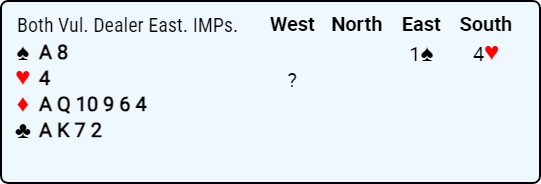
|
ACTION |
MARKS |
PANEL |
Competitors' |
|
Dbl |
10 |
14 |
32 |
|
4NT |
9 |
6 |
15 |
|
5NT |
7 |
4 |
6 |
|
6♦ |
7 |
1 |
5 |
|
5♥ |
5 |
3 |
8 |
|
5♦ |
2 |
0 |
17 |
|
4♠ |
2 |
0 |
14 |
|
Pass |
0 |
0 |
2 |
|
6♠ |
0 |
0 |
1 |
Competition Entrant Average Score: 6.34
I think this was by far the toughest problem of this set. The panel just fails to produce a majority, and the voting is actually much closer than it might at first appear, with 14 doubling and 14 making a move towards slam. Almost a third of competitors are with the largest group on the panel, but the next-largest faction opts for a choice that garnered no expert support. Let’s see who gets the best of the debate.
MOULD: Dbl. Anything else is a stab in the dark.
WANG: Dbl. This is too hard. I choose double more in hope than expectation.
MEYERS: Dbl. What a tough problem this is. I play 4NT here is RKC, so I can’t do that. I suppose I have to double and then decide what to do if partner pulls to 4♠. My other choice is 5♦, but I am not a fan of that either. Difficult!
S BALDYSZ: Dbl. If my minors were reversed, it would be easier – 4NT and then 6♣, showing minors with longer clubs. Double, I guess? Then, if partner bids spades again, I can bid 5NT, which should probably suggest longer diamonds as I didn’t go through 4NT and nor did I bid 5NT immediately.
C BALDYSZ: Dbl.
LARSSON: Dbl.
Quite a few of the doublers hoped to hear more from partner…
SHENKIN: Dbl. Partner still has a vote, so this is flexible, although 5NT pick a slam might work out best.
BIRD: Dbl. If partner has just one extra spade, we probably belong in that suit. Partner will sometimes pass the double, but even that might give us a good result. Forcing partner to choose a minor, when I may be very playable in spades, looks unattractive to me.
Some even seem to expect him to bid.
McGOWAN: Dbl. Takeout. The real problem is coming on the next round.
VILLAS-BOAS: Dbl. If my partner bids a minor, I will bid slam. Over 4♠, I’ll invite with 5♥.
KORNEGAY: Dbl. I hope we're playing negative doubles thru 4♠. If not, 6♦ would be my choice.
I don’t think it matters what you write on your convention card. The higher the overcall, the more you have to double with all sorts of good hands, and the more often partner will pass.
DE BOER: Dbl. Difficult. I am old again and take my sure plus score defending with a likely heart loser to start with and slam difficult to find out which one is the best. Double could be a disaster, but the vulnerable opponent has warned us that the distribution is likely to be extreme. If you go for the slam jackpot then I would bid 5NT, so partner can choose one. And 4NT? That doesn't solve anything.
Some accept the reality of the situation…
HUNG: Dbl. I hate it but, if partner is able to bid (a big if), then we are well placed. It's true that partner will often pass even, say, with KQxxx/xx/Kxx/QJx (which isn't good!) but, even if we bid 5NT pick a slam right now, how is partner meant to know to bid a 3-card minor? (Or, indeed, which 3-card minor. MS) Let's hope partner is able to bid something.
Larry highlights the problem with what was my choice to start with.
COHEN: Dbl. I really don't want to defend (and likely partner will pass), but the problem with bidding is that we can't comfortably find our right spot. If I bid 4NT or 5NT and partner picks clubs, how do I know he isn't 3-3 in the minors? Meanwhile, I can't really insist on diamonds or correct clubs to diamonds.
ROBSON: 5NT. I probably want to be in slam but I don’t know which one.
VIST: 5NT. I have a nice hand with short hearts. I think there is play for slam, but which one? I’ll try 5NT, pick a slam, and make partner help me decide which slam we should play.
Some tell us what they plan to do when partner bids 6♣…
ZIA: 5NT. And then 6♦…
HULT: 5NT. I will give up the clubs and bid 6♦ over 6♣.
I think the next faction have the best of the debate…
DUBOIN: 4NT. This is for takeout, not key-card. I will wait to see what partner does before deciding what to do next.
RONDON: 4NT. I plan to bid 5♦ over 5♣, and probably 6♦ over 5♦.
SCHMIDT-ZOCHOWSKA: 4NT. One rule in our system is: "when no clear fit has been established and opponents bid at the 4-level, 4NT is not keycard". It's not perfect here because, if partner bids 5♣, we have to bid 5♦, which shows a very good hand with diamonds, when the club fit could be better. But we judge that the probability of a slam is high, and don't want therefore to collect a meager +500 (or 800) from 4♥-Doubled.
SILVER: 4NT. This ain't Blackwood, but an indication of two places to play, I intend to raise any suit partner bids to slam. We are far too high to explore intelligently for a grand (or a small slam for that matter!)
Sally and Marty seem to have solved the dilemma (assuming it can be solved), and they’ve convinced me to change my mind.
BROCK: 4NT. This is take-out for me. I’m thinking of bidding 5NT if partner bids 5♣, to suggest he tries something else unless he really likes clubs.
BERGEN: 4NT. I believe that we have a slam, so I am unwilling to Double here. Based on "game before slam," I definitely think that 4NT should be for takeout. After partner's expected 5♣ bid, I will bid 5NT pick a slam to suggest long diamonds but some interest in other suits. If my partner of the moment is a Blackwood fanatic, I'd bid 5NT pick a slam now. I do understand that my suggested approaches might get us to the wrong slam.
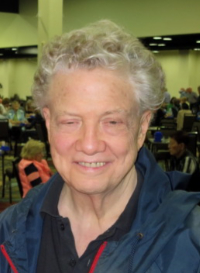
A 5♥ cue-bid sounds like a slam try in spades to me, but apparently not to…
MARSTON: 5♥. I need partner's help in choosing a slam. I expect partner to bid 5NT with no clear choice.
TABATA: 5♥. Showing slam interest without a fit in spades. In my system, 4NT would be Blackwood for spades and 5♠ asks for heart control to play 6♠.
So, isn’t 5♥ a general slam try agreeing spades with a heart control?
DEPASQUALE: 5♥. At this vulnerability, I expect South to have all the top hearts, and we will have everything else of relevance, so I want to play slam. Over 5♥, partner will show any minor suit held, or bid 5♠ with an ace-less hand and no second suit. Over that, I will try 6♦, suggesting an alternative to 6♠.
Although flying solo, Simon’s pragmatic choice is well reasoned.
DE WIJS: 6♦. I will trust South and place most of the heart values there. In that case, slam becomes a favorite and doubling 4♥ just won't do. All complicated roads to have partner cooperate in the choice of slam are flawed (heavily flawed since I play a direct 4NT as showing a spade fit) so I will bite the bullet and bid this.
At the table, partner had QJ10xx/Axx/Kx/Qxx, so 6♦ is probably the best spot. Double would clearly have ended the auction. As for the bidders, I’ll leave you to judge which of the panel’s options would have made it to the best slam.
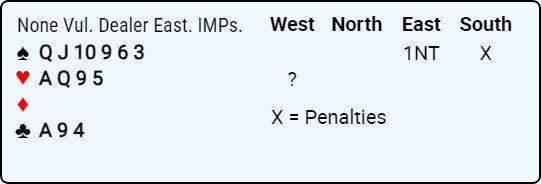
|
ACTION |
MARKS |
PANEL |
Competitors' |
|
6♠ |
10 |
14 |
5 |
|
2NT |
9 |
6 |
2 |
|
7♠ |
9 |
3 |
1 |
|
5♠ |
7 |
0 |
1 |
|
4♠ |
6 |
2 |
20 |
|
3♠ |
4 |
0 |
7 |
|
4♥ |
4 |
1 |
8 |
|
2♥ |
4 |
1 |
21 |
|
Redbl |
2 |
1 |
13 |
|
2♣ |
0 |
0 |
12 |
|
2♠ |
0 |
0 |
6 |
|
Pass |
0 |
0 |
4 |
|
3♥ |
0 |
0 |
1 |
Competition Entrant Average Score: 3.74
This is the lowest-scoring hand we have ever had, and one reason is that many competitors have just assumed that they are playing with their favorite partner. The premise of this feature is that you are partnering an unknown expert without more than a basic system discussion. It’s something we have all done many times, I’m sure. Of course, regular partnerships will know what methods they play when a 1NT opening is doubled for penalties. Many pairs these days do not play penalty doubles of a strong NT, so this is not something that happens often, and probably not a situation you would have discussed in a 10-minute system chat before a game. So, you have to be pragmatic.
All but a handful of panelists selected one of the three practical solutions to this problem. Amazingly, barely 1-in-20 competition entrants opted for one of those three choices.
DUBOIN: 7♠. With all my regular partners, I could start with a 2♥ transfer. Without an agreement that systems are on, I must bid 7♠, as South clearly does not hold the high-card points for a double, so he must have solid diamonds. This is only wrong when South’s hand is ♦AKQxxxx and ♠K-x.
SCHMIDT-ZOCHOWSKA: 7♠. What else could South hold other than AKQxxxx(x) in diamonds? Joanna would prefer to go more slowly (starting with 2♥ transfer) just in case South is Zia (or has kept his cards from the previous board).
Of course, bidding 2♥ in an undiscussed partnership runs the risk of dummy appearing.
ROBSON: 7♠. Well, there’s literally only one possibility here: South has solid diamonds. That means partner has ♠A-K, ♥K and ♣K (okay there’s one 15-count where he has all the jacks and is missing one of those kings). I think 6♠ will be the plurality answer, but I’m going to back my judgement and go all the way.
Andrew correctly predicted how the majority voted.
DE WIJS: 6♠. I usually play transfers here, but I would not risk it without discussion, so I would guess to bid 6♠.
MARSTON: 6♠. Giving up on the grand slam. And I will redouble. Thanks for the heads up, South.
BIRD: 6♠. Doubling with seven solid diamonds, hoping that there will be no further bidding, is what I might expect in a student game. Here, it has simply told us that partner is packed in the other three suits. I am saved the trouble of investigating slam.
RONDON: 6♠. It’s a 30-point deck, but it’s hard to investigate the grand so I settle for what should be a safe plus score.
BROCK: 6♠. Presumably, South has a lot of solid diamonds, perhaps with an entry. We must have everything else.
WANG: 6♠. I bid what I expect we can make.
McGOWAN: 6♠. Fixed! Could this be ‘Psyche of the Year’? Most likely, South has solid diamonds, or ♦KQJxxxx and the ♠A.
TABATA: 6♠. Assuming partner didn't psyche, South probably doesn't have a balanced 12-count for his double. I guess South has long, solid diamonds, in which case we should make slam (and even maybe a grand).
VILLAS-BOAS: 6♠. I don’t know if I can bid some transfer in this situation (if yes, I start with a transfer to spades). Playing natural, probably South has a lot of diamonds headed by the A-K-Q for his double, and one major king, or 7/8 diamonds without the ace and the ♠A. I have to decide now.
DE BOER: 6♠. It is either a psyche or South has 7+ solid diamonds for his double. That is good news for our playing strength. No wasted values. The problem here is: do you play system on (with redouble as a transfer to a minor), as many pairs here do. In that case, you can transfer quietly with 2♥. If you don't play system on, then a 'gamble-bid' to 6♠ should have chances.

KORNEGAY: 6♠. Checking the backs of the cards and, assuming we're all playing with the same deck, South can only have a penalty double if he has solid diamonds, AKQJxxx, or KQJ10xxx with an outside ace. With either of these hands, 6♠ should be cold, and maybe 7♠. If would be good if 2♥ was a transfer, then I could bid 2♥ followed by 5♦ Exclusion, but it shouldn’t be a transfer after a penalty double.
Chris leaves the door open for partner to do more perhaps.
DEPASQUALE: 6♠. I would normally play transfers on, even after a double, but I am not willing to risk a stupid result playing with an expert whose views on that subject are unknown. I jump to 6♠ and expect partner to raise to the grand slam if he holds both of the top trumps.
Gunn Tove sums up for the majority.
VIST: 6♠. It looks like South has doubled with a bunch of diamond tricks. That means my partner should have the rest of the points (more or less). We may be able to make a grand slam, but I have no idea about our agreements after 1NT-X and it's not possible to find out for sure if grand slam is the right contract. 6♠ is the practical bid.
Marty mentions the third alternative but then dismisses it.
BERGEN: 6♠. This seems absurd, but... It's very hard to believe that with our 28+ HCP, South is making a penalty double, so he must have running diamonds. In that case, it is very likely that we have a slam. 2NT should be forcing here, but I don't know what that would accomplish.
It was an action that received some heavyweight support.
SILVER: 2NT. Redouble will most probably lead to South reeling off the first seven tricks on defense via a solid diamond suit. So, I give up on trying to punish South for having the nerve to interfere in MY auction, and just find our best spot to play game. This 2NT is obviously forcing, and encourages partner to do something intelligent at the three-level. Hopefully, my ox will be up to the task, I mean the intelligent part.
ZIA: 2NT. This is a forcing bid, showing some good hand. I will follow up with 3♠ over 3-minor. We almost certainly belong in a slam, as RHO surely has solid diamonds.
MOULD: 2NT. Unless South’s double is a complete psyche, we all know what is going on here. 2NT is, of course, forcing to game and usually two-suited.
S BALDYSZ: 2NT. I would not bid 2♥ undiscussed, as that risks a stupid result. With my Mom, I can jump to 3♥, inv+ with spades then, depending on the number of spades I hear, I will raise. Without any agreements, 2NT is clearly game-forcing, either one or two-suited, so I will be able to bid my suit and see what partner has to say.
The Swedes are both still looking for a grand, so they plan to set the set suit and them investigate further, which seems to me like a most sensible strategy.
LARSSON: 2NT. 7♠ is on the horizon maybe? I have no idea how we play here so, with an undiscussed partner, I dare not risk a random transfer that partner may think is natural and non-forcing. Let’s start with 2NT, which is certainly forcing 😊.
HULT: 2NT. It looks like South has solid diamonds. Is it crazy to bid 7♠ now? 😃 Perhaps not, but 2NT is forcing for sure and it costs nothing to do some checking first.
There were only a handful who didn’t see the point of the problem.
MEYERS: 4♠. WOW! South must have some solid diamonds. I am bidding 4♠. Let LHO guess what to lead.
I suspect he could lead his convention card against game and still get a good board.
C BALDYSZ: 4♠.
At least the ladies were sure of a plus score… Barnet has perhaps been playing in the US for so long that he just assumes everyone in the world plays four-level transfers.
SHENKIN: 4♥. Let’s start with this.
And, perhaps end with it too. Andy at least knew he was risking a pass from partner, but put his faith in South to save the day.
HUNG: 2♥. Presumably my RHO has long, running diamonds, which is good news for us (i.e. no wasted values). Ideally. I'd prefer to Texas transfer to spades, followed by 5♦ as Exclusion Key Card, but it appears Texas transfers are not part of our system. As there is no "run out of 1NT-X scheme", I'll presume we play system on and bid 2♥ transfer. I plan to rebid 5♦ as Exclusion Key Card. If partner happens to pass 2♥, I'm sure my RHO will save me by bidding 3♦, now that would make a funny auction!
Of course, that strategy may not be as effective in these days of self-alerting, as South will know you have had a misunderstanding.
Only Larry was willing to give South the last laugh.
COHEN: Redbl. My partners don't psyche, so this makes no sense to me. Anyway, what is this Redouble? Likely systemic, but I can't see any other way to start.
I think South is still cashing diamond winners, Larry 😊
2NT is not conventional as such, but simple bridge logic says it cannot be natural, and your unknown expert will certainly work that out. When I saw the hand played at the table, West jumped to 7♠, and right he was too, as partner had AKx/Kx/xxx/KQ10xx so the grand slam had as easy 13 tricks.
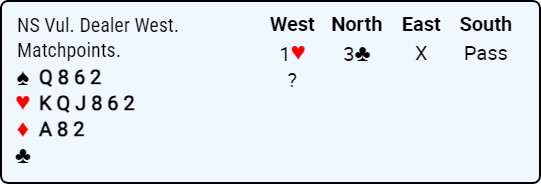
|
ACTION |
MARKS |
PANEL |
Competitors' |
|
4♣ |
10 |
18 |
22 |
|
4♥ |
8 |
5 |
10 |
|
4♠ |
6 |
3 |
14 |
|
3♠ |
5 |
2 |
32 |
|
3♥ |
3 |
0 |
17 |
|
Pass |
0 |
0 |
4 |
Competition Entrant Average Score: 5.95
Another large majority vote from the panel, although exactly what their choice means does not seem to be universally agreed. Competitors are split into two main camps. Let’s start with those panelists who simply bid some number of spades.
MEYERS: 3♠. Another tough problem. I have gone back and forth on this one, and ultimately landed on 3♠. Partner presumably has four (or more) of those.
SILVER: 3♠. Playing pairs, it does not pay to get overly aggressive, risking a minus, especially in a crowded auction where distributional storms are brewing. If partner cannot raise, I am sure our best chance for a plus is right here at the three-level, NOT in game.
KORNEGAY: 4♠. I am not quite strong enough for a 4♣ clue bid, but I have just enough for a jump to 4♠.
HULT: 4♠.
DE BOER: 4♠. For me, 4♣ is an overbid, as jumping to 4♠ promises some good values. Partner needs both good spades and the ♥A for slam, otherwise a heart ruff is a danger. A club lead, shortening out trumps, may also be unpleasant. These kinds of hands could play easier in 4♥ in the 6-1 or 6-2 fit than 4♠, but I don't like masterminding and gambling.
So, what do those who preferred to rebid their own suit have to say for themselves?
WANG: 4♥. A little overbid, perhaps, but the good suit makes it worthwhile.
Some question the validity of the assumption that partner will hold four spades.
ZIA: 4♥. Who said partner has to hold four spades? What is he supposed to bid with something like AJx/xx/KQxxx/Qxx?
COHEN: 4♥. Partner’s three-level negative double does not guarantee four spades, so I'll rebid my excellent hearts. I have too much to bid only 3♥: Picture partner with something like KJx/Ax/Q10xxx/Jxx.

SCHMIDT-ZOCHOWSKA: 4♥. We have a good hand, but not that much either. East did not promise 4♠, nor a strong hand either.
David raises the question of what a 4♣ cue-bid shows…
BIRD: 4♥. The alternative of 4♣ would surely agree spades and, although partner is likely to hold four spades, it is not certain. After my recent cataract operations (rescuing me from seven decades of appalling short sight), I can 'see' ♥A-x in partner’s hand.
As David suggests, some intend the cue-bid as showing a hand too strong for a jump to 4♠.
ROBSON: 4♣. I think I’m just a tad good for 4♠, so I will go via 4♣.
VILLAS-BOAS: 4♣. This looks like a good hand to play in spades.
S BALDYSZ: 4♣. It depends what the double shows (some people play it as GF, in which case I could bid 3♠ to show a better hand). Assuming double is not game-forcing, then I bid 4♣: opposite ♠A-K and the ♥A, I have a decent shot at making slam.
A number don’t tell us exactly what it means…
BERGEN: 4♣. Finally, a problem where I feel very good about my answer.
DUBOIN: 4♣. Let’s dance.
VIST: 4♣. Not many high-card points, but a hand with playing strength. 4♣ is my choice.
C BALDYSZ/SHENKIN/LARSSON: 4♣.
BROCK: 4♣. I’m not quite sure which major this agrees!
The majority seem to think it simply offers partner a choice of game.
DE WIJS: 4♣. Initially choice of games, typically showing 4-6.
TABATA: 4♣. Offering a choice of major-suit games. Partner will occasionally not hold four spades for his double,
MARSTON: 4♣. Help me choose the best game.
McGOWAN: 4♣. Hopefully, partner will read this as showing doubt about which is the best game.
RONDON: 4♣. I could play in either Major, so let's hear what partner has to contribute.
MOULD: 4♣. It ain't necessarily right to play in spades if partner has only four of them. Plus, this hand has considerable slam potential. I am rather surprised (but thankful) that South has not raised clubs.
DEPASQUALE: 4♣. I need more information from partner to decide the final destination and this seems the best place to start. If I get a 4♠ response, 5♣ will then be Exclusion Key-card.
Whilst Andy seems to think it just shows an undefined good hand.
HUNG: 4♣. This shows any sort of good hand. Presumably, partner will bid 4♥ (on the assumption I might have one-suiter in hearts). I will then continue with 4♠ to show a good 4♠ bid.
South’s failure to raise clubs suggests partner may have a good hand with some club length. At the table, he had AKx/Ax/Kxxx/10xxx. Spades were not 3-3, so 4♥ was the best spot, although you could make 12 tricks if you correctly guessed which squeeze to play for. Jumping to 4♠ left partner with a tough decision.
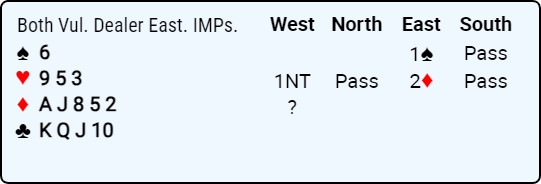
|
ACTION |
MARKS |
PANEL |
Competitors' |
|
4♦ |
10 |
11 |
22 |
|
4♣ |
9 |
6 |
1 |
|
3NT |
8 |
3 |
5 |
|
3♥ |
7 |
1 |
1 |
|
3♦ |
5 |
6 |
40 |
|
5♦ |
5 |
1 |
12 |
|
3♣ |
0 |
0 |
11 |
|
Pass |
0 |
0 |
4 |
|
2NT |
0 |
0 |
2 |
|
2♥ |
0 |
0 |
1 |
Competition Entrant Average Score: 5.36
No majority from the panel, but a clear favorite nonetheless. Most of the panel also made it clear that they did not think the competitors’ most popular choice (3♦) was enough on this hand. Let’s start with the handful who disagreed with that assessment…
WANG: 3♦. 3♦ is simple and I see no better choice.
KORNEGAY: 3♦. Game is possible, but I don't like the three dead hearts. I simply invite with a raise to 3♦.
Most of this group appreciated that they were very good for their bid.
MARSTON: 3♦. Perhaps an underbid, but I see no clear way forward.
McGOWAN: 3♦. Better than I might be, but I would need a side ace to raise to 4♦.
BROCK: 3♦. This is a huge underbid but, without any methods, what can I do? This is why people play Gazzilli or transfers in this position.
BERGEN: 3♦. Obviously, I could bid this with less, but I don't like the alternatives.
So, what are those alternatives?
RONDON: 4♦. No alternative in sight, as 3♦ seems too little and 5♦ too much.
SHENKIN: 4♦. 3♦ does not seem like enough, although it may be right.
VIST: 4♦. After partner’s 2♦, I have a super-maximum for my 1NT. This hand is too good for 3♦, so let’s see if 4♦ inspires partner.
MEYERS: 4♦. Distributional and highly invitational.
VILLAS-BOAS: 4♦. A maximum with good support for diamonds.
DE WIJS: 4♦. This almost always shows short spades, so partner can judge well.
DE BOER: 4♦. For me, this would be a Gazzilli situation. I think this jump to 4♦ is a strong invitation but non-forcing. All will depend on partner’s shape. The opponents haven't bid hearts, so a singleton heart is unlikely. There are enough hands to think of where the 5♦ is ok, even opposite a. 5-2-4-2. If partner has a 5-3-4-1 shape, we may be in trouble, as he could raise to 5♦ without any chance.
Simon highlights another of the possibilities.
HULT: 4♦. This doesn't look like a 3NT hand, and we could easy make 5♦ opposite a good minimum. I play 3♥ here as this hand, showing short spades and a big hand for diamonds.
Whilst David and Larry mention another alternative with various degrees of enthusiasm for it.
BIRD: 4♦. I don't see that 4♣ would clearly show tricks there, rather than a control, so I will keep it simple.
COHEN: 4♦. If 4♣ were fit-showing, that would be my (better) description. You didn't say if 1NT was forcing or semi-forcing. It would be nice to know that partner isn't 5-3-3-2.
Andy sums up for the largest faction on the panel.
HUNG: 4♦. Is 3NT natural or a splinter in spades? I can't really risk it undiscussed, and 3♦ feels a bit of an undercook, so I'll try 4♦. Of course, it can be overboard (e.g. opposite something like KQxxx/Qxx/KQxx/x), but I'll take my chances. 4♦ also bypasses a potential 3NT (e.g. opposite Kxxxx/Kx/KQxx/Ax), although sometimes partner might open 1NT with those hands that contain honour(s) in the short suits.
Only Chris was prepared to simply commit to game.
DEPASQUALE: 5♦. We might be off three aces, but there are plenty of layouts on which 5♦ will make while 3NT has no chance. It is worth noting that such auctions frequently elicit a trump lead at trick one, particularly if the opening leader holds spade honours. That might give declarer a vital tempo here. The payoff for a vulnerable game is worth taking a few risks for.
There was also support for some more exotic ways of describing the hand.
TABATA: 3NT. Showing a strong diamond fit with short spades (else 3♠ to show H-x in spades) and no heart honor (else 3♥), therefore likely club values.
S BALDYSZ: 3NT. With my Mom, I play 3♥ to show a diamond fit without H-x in spades. (With an invitational hand with hearts, I jump directly over 1♠ and with weak hearts I just bid 2♥ over 2♦.) Without this agreement, I think I 3NT should show something similar. Partner can take it from there: we can play 3NT, 4♦, 5♦ or even 6♦ if partner has something like Axxxx/Ax/Kxxx/Ax.
C BALDYSZ: 3♥.
SCHMIDT-ZOCHOWSKA: 3NT. This shows a hand with maximum strength for our 1NT bid, long diamonds (we would prefer to have six, but nobody's perfect), and a spade shortness. (3♠ would show long diamonds and H-x in spades.) Despite the fact we play Gazzilli (thus partner's hand is limited to 14+ HCP), we believe we have too much for 3♦. 4♣ would definitely show clubs+diamonds for us, but do we want to eliminate 3NT as a possible contract?
A sizeable group chose what looks like the most descriptive bid available…
SILVER: 4♣. In the colonies this is played as fit showing. At the end of the hand, I will find out what it means in the Mother Country.

Having conducted the Bridge Magazine panel for many years, one might think that Alan would know better than to make predictions, although he will not be disappointed to be wrong this time.
MOULD: 4♣. For me, this is a fit jump. I don't expect many marks for this.
ZIA: 4♣. Fit jump. Although, 3NT to show big diamonds and short spades was a Kokish favourite method, and would also be good here.
LARSSON: 4♣.
DUBOIN: 4♣. I do not think this could be understood as a splinter.
Andrew is quite happy to make what his partner may think is a splinter bid on K-Q-J-10!
ROBSON: 4♣. I am hoping partner may read this but, even if he thinks it’s a splinter, it’ll work quite well. Either way, he’ll know a singleton heart is gold dust.
At the table, partner had Q10xxx/A/Q109x/Axx so 5♦ was easy and even 6♦ playable. With the ♦K offside, 3NT fails on the obvious heart lead.
This was clearly a tough set, with barely half of the panel scoring in the 70s. Jessica Larsson leads the panel with an impressive 78/80, and the podium is completed by Miguel Villas-Boas (77/80), David Bird and Alan Mould (both with 76/80). A special mention to one of our guest panelists, Wubbo de Boer, who finished right up there with 74/80.

As usual, our thanks to all members of the panel, for contributing their time to educate and entertain our readers. We hope to see you all again next month.
|
Jessica LARSSON |
Pass |
3NT |
Pass |
2NT |
Dbl |
2NT |
4♣ |
4♣ |
78 |
|
Miguel VILLAS-BOAS |
Pass |
4♣ |
Pass |
2NT |
Dbl |
6♠ |
4♣ |
4♦ |
77 |
|
David BIRD |
Pass |
3NT |
Pass |
3♣ |
Dbl |
6♠ |
4♥ |
4♦ |
76 |
|
Alan MOULD |
Pass |
3NT |
Dbl |
2NT |
Dbl |
2NT |
4♣ |
4♣ |
76 |
|
Sophia BALDYSZ |
1NT |
3NT |
Pass |
2NT |
Dbl |
2NT |
4♣ |
3NT |
75 |
|
Liz McGOWAN |
Pass |
3NT |
Pass |
2NT |
Dbl |
6♠ |
4♣ |
3♦ |
75 |
|
Wubbo DE BOER |
Pass |
3NT |
Pass |
3♣ |
Dbl |
6♠ |
4♠ |
4♦ |
74 |
|
Andy HUNG |
Pass |
3NT |
Pass |
2NT |
Dbl |
2♥ |
4♣ |
4♦ |
74 |
|
Andrew ROBSON |
Pass |
3NT |
Dbl |
2NT |
5NT |
7♠ |
4♣ |
4♣ |
73 |
|
Hanoi RONDON |
2♥ |
3NT |
Dbl |
2NT |
4NT |
6♠ |
4♣ |
4♦ |
73 |
|
Gunn Tove VIST |
1NT |
3NT |
Pass |
3♣ |
5NT |
6♠ |
4♣ |
4♦ |
73 |
|
Giorgio DUBOIN |
Pass |
4♣ |
Pass |
3♥ |
4NT |
7♠ |
4♣ |
4♣ |
71 |
|
Wenfei WANG |
1NT |
3NT |
Pass |
2NT |
Dbl |
6♠ |
4♥ |
3♦ |
71 |
|
Larry COHEN |
Pass |
3NT |
Pass |
2NT |
Dbl |
Rdbl |
4♥ |
4♦ |
70 |
|
Simon DE WIJS |
1NT |
3NT |
2NT |
2NT |
6♦ |
6♠ |
4♣ |
4♦ |
70 |
|
Barnet SHENKIN |
Pass |
3NT |
Dbl |
3♥ |
Dbl |
4♥ |
4♣ |
4♦ |
69 |
|
Cathy BALDYSZ |
1NT |
4♣ |
Pass |
2NT |
Dbl |
4♠ |
4♣ |
3♥ |
68 |
|
Chris DEPASQUALE |
Pass |
3NT |
Pass |
3♣ |
5♥ |
6♠ |
4♣ |
5♦ |
68 |
|
Peirre SCHMIDT and Joanna ZOCHOWSKA |
Pass |
3NT |
3♣ |
3♣ |
4NT |
7♠ |
4♥ |
3NT |
68 |
|
Sally BROCK |
2NT |
3NT |
Dbl |
2NT |
4NT |
6♠ |
4♣ |
3♦ |
67 |
|
Simon HULT |
Dbl |
3NT |
Dbl |
2NT |
5NT |
2NT |
4♠ |
4♦ |
65 |
|
Stephen KORNEGAY |
1NT |
4♣ |
Pass |
3♣ |
Dbl |
6♠ |
4♠ |
3♦ |
64 |
|
Paul MARSTON |
Dbl |
3NT |
Dbl |
2NT |
5♥ |
6♠ |
4♣ |
3♦ |
63 |
|
Jill MEYERS |
Pass |
4♣ |
Dbl |
3♥ |
Dbl |
4♠ |
3♠ |
4♦ |
63 |
|
Marty BERGEN |
2♣ |
3NT |
Dbl |
Pass |
4NT |
6♠ |
4♣ |
3♦ |
62 |
|
Nao TABATA |
2♠ |
Dbl |
Pass |
3♣ |
5♥ |
6♠ |
4♣ |
3NT |
61 |
|
Zia MAHMOOD |
2NT |
4♣ |
3♣ |
3♥ |
5NT |
2NT |
4♥ |
4♣ |
58 |
|
Joey SILVER |
Dbl |
Pass |
3♣ |
3♥ |
4NT |
2NT |
3♠ |
4♣ |
55 |
|
|
|
|
|
|
|
|
|
|
|
|
TOP SCORE |
Pass |
3NT |
Pass |
2NT |
Dbl |
2 |
4♣ |
D |
|
|
HAND 1: |
Pass 10 |
1NT 8 |
2♥/2♠ 6 |
2♣/2NT/Dbl 5 |
3♣ 2 |
|
|
HAND 2: |
3NT 10 |
4♣ 7 |
Pass 5 |
Dbl 4 |
5♣ 2 |
|
|
HAND 3: |
Pass 10 |
Dbl 8 |
3♣ 6 |
2NT 5 |
|
|
|
HAND 4: |
2NT 10 |
3♣ 8 |
3♥ 7 |
3♦/Pass 5 |
|
|
|
HAND 5: |
Dbl 10 |
4NT 9 |
6♦/5NT 7 |
5♥ 5 |
4♠/5♦ 2 |
|
|
HAND 6: |
6♠ 10 |
7♠/2NT 9 |
5♠ 7 |
4♠ 6 |
3♠/2♥/4♥ 4 |
Redbl 2 |
|
HAND 7: |
4♣ 10 |
4♥ 8 |
4♠ 6 |
3♠ 5 |
3♥ 3 |
|
|
HAND 8: |
4♦ 10 |
4♣ 9 |
3NT 8 |
3♥ 7 |
3♦/5♦ 5 |
|
|
HAND 1: |
5.28 |
|
HAND 2: |
5.99 |
|
HAND 3: |
8.70 |
|
HAND 4: |
7.31 |
|
HAND 5: |
6.34 |
|
HAND 6: |
3.74 |
|
HAND 7: |
5.95 |
|
HAND 8: |
5.36 |